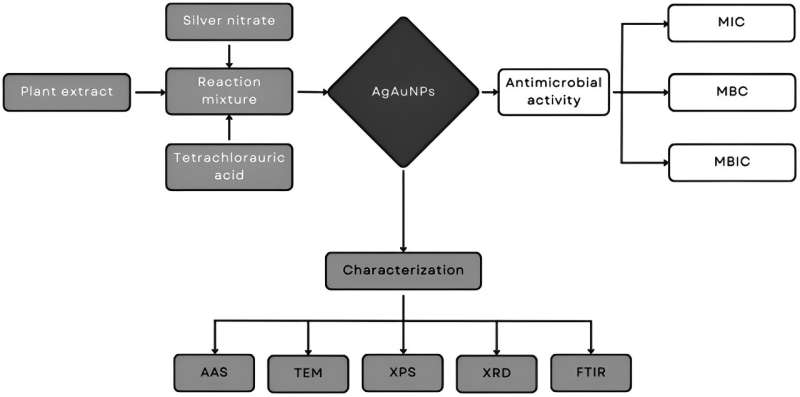
August 12, 2024 by University of Chemistry and Technology Prague
Collected at: https://phys.org/news/2024-08-eco-friendly-nanoparticles.html
Researchers at the University of Chemistry and Technology in Prague have successfully synthesized bimetallic nanoparticles using waste extracts from Cannabis sativa and Vitis vinifera, showcasing an eco-friendly approach with potent antimicrobial properties. The work is published in the journal RSC Advances.
In the quest for sustainable solutions, this research focused on the green synthesis of nanoparticles, emphasizing the valorization of plant waste.
“Our study aims to contribute to a circular economy by transforming agricultural waste into valuable materials,” stated Jana Michailidu, the corresponding author of the study.
“The use of Cannabis sativa and Vitis vinifera waste not only addresses waste management challenges but also provides an effective method to combat microbial infections.”
The research involved extracting bioactive compounds from the scrap materials from these plants, which were then mixed with silver nitrate and tetrachloroauric acid to produce bimetallic nanoparticles (AgAuNPs).
These nanoparticles were characterized using various advanced techniques such as UV-Vis spectrophotometry, transmission electron microscopy, and X-ray diffraction. The study highlighted that these nanoparticles exhibited significant antimicrobial activity against several strains of Pseudomonas aeruginosa, a notorious Gram-negative bacterium.
“The antimicrobial properties of the biosynthesized AgAuNPs are particularly promising,” Michailidu explained. “They not only inhibit the growth of Pseudomonas aeruginosa but also prevent biofilm formation, which is crucial in the fight against antibiotic-resistant infections.”
The study’s findings emphasize the dual benefits of this approach: effective waste management and the production of valuable antimicrobial agents.
“This research supports the development of eco-friendly and cost-effective approaches for nanoparticle production, addressing both environmental and public health challenges,” Michailidu added.
The successful synthesis and characterization of these nanoparticles marks a significant step forward in sustainable nanotechnology. The University of Chemistry and Technology in Prague continues to lead in innovative research that aligns with global sustainability goals.
More information: Jana Michailidu et al, Bimetallic nanoparticle production using Cannabis sativa and Vitis vinifera waste extracts, RSC Advances (2024). DOI: 10.1039/D3RA07134K
Journal information: RSC Advances

Leave a Reply